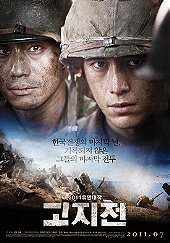
The Front Line is set in the waning days of the Korean War, as the North and the South continue to attempt negotiations to end the hostilities and mutually agree on a border. Intelligence officer Eun-pyo Kang (Ha-kyun Shin) is sent to the front lines to investigate the recent death of a field lieutenant from Alligator Company, as there are fears that a spy is amongst them. Kang heads to Aerok Hills, a strategic location that keeps changing hands amid the fighting. Within Alligator Company is one of Kang's former comrades, Soo-hyuk Kim (Soo Go), whom he had long thought dead. To Kang's shock, Kim has become a fearless commander, relinquishing his humanity to become a ruthless leader lacking a moral compass. As it turns out, the situation at Aerok Hills is far more complicated than Kang could have imagined, confounding Kang as he also has to deal with the ever-present threat of the North Korean soldiers.
Although North Korea is prevalent in the media at present, it's doubtful that many Westerners actually know much about Korea's long history or, indeed, much about the Korean War. The Front Line is a bit hard to follow at times as some facets of the war aren't sufficiently explained, not to mention the structure is confusing, with a few flashbacks that are inadequately clarified. But once the main story kicks in, the film soars. What's especially notable about The Front Line is how it underscores the futility of war and highlights that everyday soldiers have no hatred for their enemies outside of what they're told to do. Aerok Hills changes hands so much that South Korean soldiers dig a small hole to store chocolates, matches, and cigarettes. The other side finds this hole and takes the items but leaves other things, including rice, wine and letters to home that they hope their enemies will post. Later, once the ceasefire is signed and the war is over, a troupe of soldiers are bathing themselves, and their enemies pass by. But they don't open fire on each other, prompting a North Korean officer to comment, "I guess it's really over." Furthermore, I'm not sure how accurate the climax is, but it's heart-wrenching to watch as it sums up the irrationality of war in a potent fashion. The messages are familiar, but that doesn't make them any less impactful.

It's inarguable that Korea has emerged as a moviemaking force to be reckoned with over the past decade or so, and The Front Line is another superlative demonstration of the country's abilities. The flick was produced on a relatively modest budget, but you'd never know it; it has the appearance of a $100 million blockbuster, with large-scale battle scenes and spot-on production values. The reason for this is pretty clear - Koreans don't work for exorbitant sums, nor are they driven by ego, hence the majority of the funding goes towards sets, costumes and locations. The Front Line is a breathtaking cinematic experience, with riveting battle sequences assembled with top-notch skill in every department. The immersive sound design makes you feel in the thick of the action, the film pulls no punches when it comes to gore, and the special effects are seamless, resulting in some of the finest combat scenes in recent memory. Moody lighting design also adds visual interest; one of the battles is lit by sporadic flares. Fortunately, outside of the big battle scenes, director Hun Jang shows a great filmmaking eye. If there's anything to nit-pick, it's that The Front Line was shot digitally on Red Epic cameras when a grainy 35mm aesthetic (like Saving Private Ryan) would have been more effective.
While the characters at the centre of the film are stereotypes, the actors imbue their roles with enough depth to make them believable. The dialogue between the soldiers is unusually strong, and the script shows a proclivity for philosophical discussions, exploring the effects of war on a man's soul. The Front Line is well balanced between character interaction and large-scale battle scenes, emphasising that this is a war drama instead of an exploitative action film. It's a fine line to walk, and Jang nails it. However, the acting from the English-speaking American soldiers is utterly horrendous: stiff, wooden and unbelievable. At least said performers are only present in one scene, though.

The Front Line is not perfect - its opening scenes are clunky and unfocused, it's overlong at almost two hours, and it devolves into some needless melodrama in its third act - but it's a breathtaking motion picture, and its minor flaws are not enough to undo the movie's endless strengths. War buffs owe it to themselves to seek this one out; it's easily on a par with the wildly acclaimed The Brotherhood of War.
7.8/10
 Login
Login